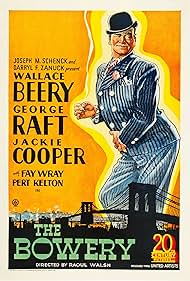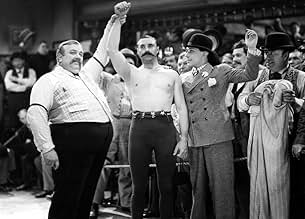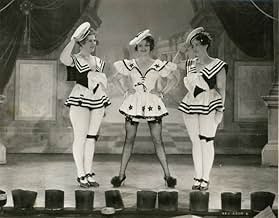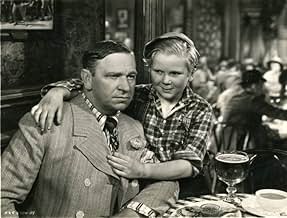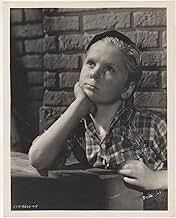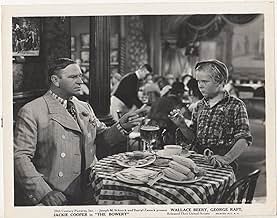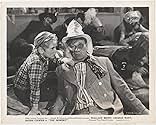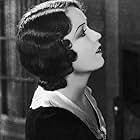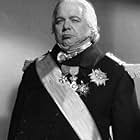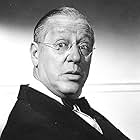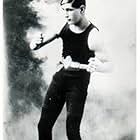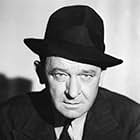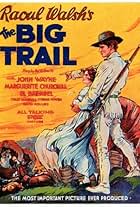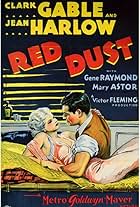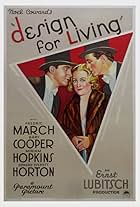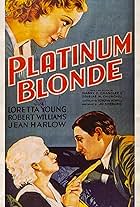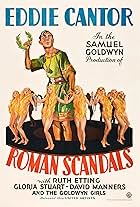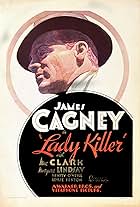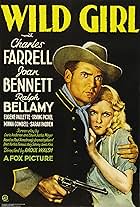In New York's Bowery during the Gay Nineties, a saloon owner and a rebel share a rivalry.In New York's Bowery during the Gay Nineties, a saloon owner and a rebel share a rivalry.In New York's Bowery during the Gay Nineties, a saloon owner and a rebel share a rivalry.
- Awards
- 3 wins total
Bull Anderson
- Pug
- (uncredited)
Irving Bacon
- Hick
- (uncredited)
Lucille Ball
- Blonde
- (uncredited)
John Bleifer
- Mumbo the Mute
- (uncredited)
Phil Bloom
- Pug
- (uncredited)
James Burke
- Recruiting Sergeant
- (uncredited)
Marguerite Caverley
- Undetermined Secondary Role
- (uncredited)
Featured reviews
In Brooklyn a century ago, the rivalry between Chuck Connors and Steve Brodie and their competing volunteer fire brigades leads to Brodie's famous bet that he can jump off the Brooklyn Bridge. This is a story which will be familiar to a lot of people through a Bugs Bunny spoof, "Bowery Bugs" from 1949.
This generally very enjoyable film would probably be more widely available if it were not for the notorious and unsettling scene involving some Chinese tenement dwellers -- a time capsule of antediluvian racial attitudes, giving the film a great deal of historical interest, in my view.
This generally very enjoyable film would probably be more widely available if it were not for the notorious and unsettling scene involving some Chinese tenement dwellers -- a time capsule of antediluvian racial attitudes, giving the film a great deal of historical interest, in my view.
"The Bowery", along with "Me and My Gal"(1932), is probably director Raoul Walsh's best film at Fox. This is a one Walsh picture that will appeal to all kinds of audiences and perhaps turn you into a devoted Walsh enthusiast. I've always been a big Walsh fanatic and "Bowery" is one of few of his pictures that has eluded for quite some time. I finally saw it and was blown away by it.
"Bowery" is also Walsh's best film of 1933, easily eclipsing the ponderous "Going Hollywood". Inspired by Mae West's hugely successful comedy-riot "She Done Him Wrong", Walsh rightfully turned this pre-Code frolic into his own. All the Walsh touches are here in full bloom: the rousing ebullience & energy, the portrait of everyday life, the sheer innocence of its characters, the nostalgic evocation of the Gay 90s (Walsh's own impressionable years), and the unsophisticated resort to ribald humor, brawls, and jocularity. It also features John L. Sullavan, Errol Flynn's famous opponent in Walsh's 1942 boxing classic "Gentleman Jim".
George Raft and Wallace Beery are excellent as the two rivals in New York's Bowery of the 1890s. They are fighting for the love of Fay Wray (always a welcome sight). Jackie Cooper, playing the streetwise rascal, reunites with Beery after their successful teaming in Vidor's "The Champ" and it is great to watch them again.
Ultimately, though, it is Walsh's sheer exuberance that counts the most. "Bowery" is one of my all-time favorite films, the kind of picture that you would like to watch again and again. A must if you get a chance to see it.
"Bowery" is also Walsh's best film of 1933, easily eclipsing the ponderous "Going Hollywood". Inspired by Mae West's hugely successful comedy-riot "She Done Him Wrong", Walsh rightfully turned this pre-Code frolic into his own. All the Walsh touches are here in full bloom: the rousing ebullience & energy, the portrait of everyday life, the sheer innocence of its characters, the nostalgic evocation of the Gay 90s (Walsh's own impressionable years), and the unsophisticated resort to ribald humor, brawls, and jocularity. It also features John L. Sullavan, Errol Flynn's famous opponent in Walsh's 1942 boxing classic "Gentleman Jim".
George Raft and Wallace Beery are excellent as the two rivals in New York's Bowery of the 1890s. They are fighting for the love of Fay Wray (always a welcome sight). Jackie Cooper, playing the streetwise rascal, reunites with Beery after their successful teaming in Vidor's "The Champ" and it is great to watch them again.
Ultimately, though, it is Walsh's sheer exuberance that counts the most. "Bowery" is one of my all-time favorite films, the kind of picture that you would like to watch again and again. A must if you get a chance to see it.
Four words account for why this film was made - "She Done Him Wrong". The huge commercial success of that Mae West vehicle convinced the studio brass that Gay '90s melodramas were a viable proposition. Here we are rewarded with a fast moving, well written romp which neatly targets the personalities of its stars.
Wallace Beery and George Raft are excellent as friendly rivals; Jackie Cooper is a little harder to take, but it is Fay Wray who steals the film with her stock-in-trade damsel in distress. With a strong director - as Walsh proves himself to be - Wray could carry a lot of punch, and she is utterly believable as the object of both Raft and Beery's affection.
Lots of atmosphere, beautifully designed, this is a forgotten film worthy of revival.
Wallace Beery and George Raft are excellent as friendly rivals; Jackie Cooper is a little harder to take, but it is Fay Wray who steals the film with her stock-in-trade damsel in distress. With a strong director - as Walsh proves himself to be - Wray could carry a lot of punch, and she is utterly believable as the object of both Raft and Beery's affection.
Lots of atmosphere, beautifully designed, this is a forgotten film worthy of revival.
Culled from the real life exploits of Chuck Connors and Steve Brodie in 1890s New York, "The Bowery" is high energy and good natured.
But be warned: Casual racial epithets flow off the tongues of Wallace Beery and little Jackie Cooper. The very first shot might be startling. This is true to the time it was set and the time it was made. And it also speaks to the diversity of population in that neck of the woods. It certainly adds to the gritty flavor of the atmosphere.
Beery as Connors is the blustering thunder at the center of the action, a loud-mouth saloon keeper with his own fire brigade. And he has a soft spot for ornery orphan Cooper. Raft as Brodie is Connors' slicker, better looking rival in almost every endeavor. Brodie could never turn down a dare and loved attention, leading up to a jump off the Brooklyn Bridge (it is still debated whether he actually jumped or used a dummy).
Beery is as bombastic as ever with a put-on Irish-American accent. He is just the gruff sort of character to draw children, cats and ladies in distress. This is possibly the most boisterous character Raft ever played, and he even gets to throw in a little dancing (as well as a show of leg). And again he mistakes the leading lady (lovely Fay Wray) for a prostitute. Cooper is as tough as either of them, though he gets a chance to turn on the tears.
The highlight isn't the jump off the bridge but a no-holds-barred fistfight between Connors and Brodie that in closeup looks like a real brawl between the principals. It's sure someone bruised more than an ego.
But be warned: Casual racial epithets flow off the tongues of Wallace Beery and little Jackie Cooper. The very first shot might be startling. This is true to the time it was set and the time it was made. And it also speaks to the diversity of population in that neck of the woods. It certainly adds to the gritty flavor of the atmosphere.
Beery as Connors is the blustering thunder at the center of the action, a loud-mouth saloon keeper with his own fire brigade. And he has a soft spot for ornery orphan Cooper. Raft as Brodie is Connors' slicker, better looking rival in almost every endeavor. Brodie could never turn down a dare and loved attention, leading up to a jump off the Brooklyn Bridge (it is still debated whether he actually jumped or used a dummy).
Beery is as bombastic as ever with a put-on Irish-American accent. He is just the gruff sort of character to draw children, cats and ladies in distress. This is possibly the most boisterous character Raft ever played, and he even gets to throw in a little dancing (as well as a show of leg). And again he mistakes the leading lady (lovely Fay Wray) for a prostitute. Cooper is as tough as either of them, though he gets a chance to turn on the tears.
The highlight isn't the jump off the bridge but a no-holds-barred fistfight between Connors and Brodie that in closeup looks like a real brawl between the principals. It's sure someone bruised more than an ego.
A favourite of mine,this movie tells of two feuding New York "characters", Steve Brodie(Raft) and "Chuck" Connors(Beery),who both strive to be the "Main Guy" in the Bowery in the late Nineteenth Century.
Brodie(1863-1901) and Connors(1852-1913),were real people,though this is a heavily fictionalized account of their antics(based on a play).Brodie's legendary(did he do it?- it's still a cause of argument!),jump from the Brooklyn bridge(1886),for which he became famous,is shown here as happening around the same time as the Spanish-American war(1898).Director Walsh clearly had a great affection for the period,so beautifully recreated here,and it includes a wild rumbustious ragtime number from saloon singer Trixie Odbray(a young Pert Kelton).Raft is at his slickest as Brodie,and Beery shows again what a clever actor he was,as tough, big hearted, and at times quite touching Connors.Pretty Fay Wray is the love interest both the boys are pursuing.
Full of life and energy,"The Bowery" moves at a fast pace(unlike many early "talkies").It is not an easy movie to find,but is well worth looking out for.
Brodie(1863-1901) and Connors(1852-1913),were real people,though this is a heavily fictionalized account of their antics(based on a play).Brodie's legendary(did he do it?- it's still a cause of argument!),jump from the Brooklyn bridge(1886),for which he became famous,is shown here as happening around the same time as the Spanish-American war(1898).Director Walsh clearly had a great affection for the period,so beautifully recreated here,and it includes a wild rumbustious ragtime number from saloon singer Trixie Odbray(a young Pert Kelton).Raft is at his slickest as Brodie,and Beery shows again what a clever actor he was,as tough, big hearted, and at times quite touching Connors.Pretty Fay Wray is the love interest both the boys are pursuing.
Full of life and energy,"The Bowery" moves at a fast pace(unlike many early "talkies").It is not an easy movie to find,but is well worth looking out for.
Did you know
- TriviaGeorge Raft and Wallace Beery were at odds during filming. According to Raft, before the fistfight scene, Beery asked Raft to let him throw the first punch and then proceeded to sucker-punch Raft, knocking him out for several minutes. "When I came to I got up and called him everything I could think of," Raft said. They then fought for real, and the crew had to break it up.
- GoofsThe name of George Raft's character, "Steve Brodie," is misspelled "Brody" in the opening credits.
- Quotes
Steve Brodie: Don't ever say I never give ya nothin'.
- Alternate versionsThe version shown on Fox Movie Channel runs seven seconds over 87 minutes. Apparently it is a reissue copy, the missing five minutes due to reediting to fit post code rules. Though it was made for Twentieth Century Films, a new start up film studio organized by Joe Schenck, Bill Goetz (L.B. Mayer's son-in-law) and ex-Warner Bros. production chief Darryl Zanuck, the FMC version is presented under the post merger logo of Twentieth Century Fox complete with fanfare and an end title crediting distribution to TCF. This year a full uncut version was shown at New York's Film Forum which clocked several minutes over ninety minutes.
- ConnectionsEdited into Brooklyn Bridge (1981)
- SoundtracksThe Bowery
(uncredited)
Music by Percy Gaunt
Lyrics by Charles Hale Hoyt
Sung by a chorus at the beginning
Played often in the score
- How long is The Bowery?Powered by Alexa
Details
- Release date
- Country of origin
- Language
- Also known as
- Oko za oko, zub za zub
- Production company
- See more company credits at IMDbPro
Box office
- Budget
- $421,496 (estimated)
- Runtime1 hour 32 minutes
- Color
- Aspect ratio
- 1.37 : 1
Contribute to this page
Suggest an edit or add missing content

